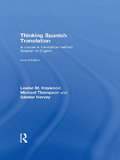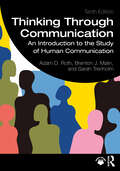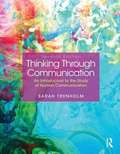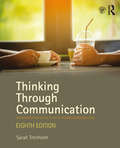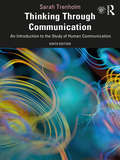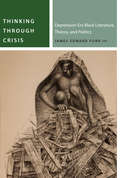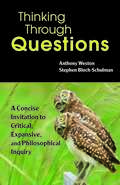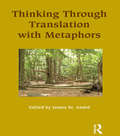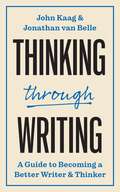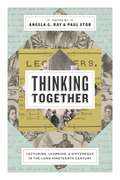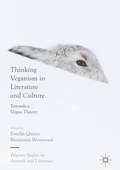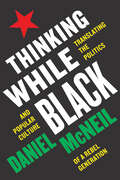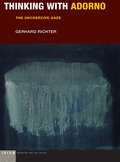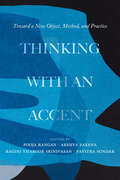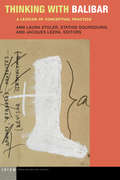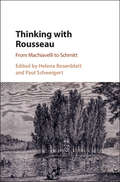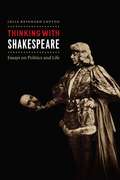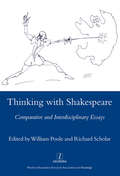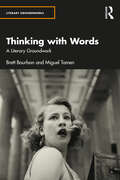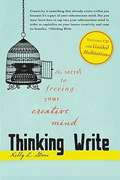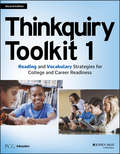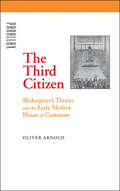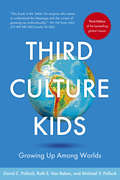- Table View
- List View
Thinking Spanish Translation: A Course in Translation Method: Spanish to English (Thinking Translation)
by Louise Haywood Michael Thompson Sándor HerveyThe new edition of this comprehensive course in Spanish-English translation offers advanced students of Spanish a challenging yet practical approach to the acquisition of translation skills, with clear explanations of the theoretical issues involved. A variety of translation issues are addressed, including: cultural differences register and dialect grammatical differences genre. With a sharper focus, clearer definitions and an increased emphasis on up-to-date ‘real world’ translation tasks, this second edition features a wealth of relevant illustrative material taken from a wide range of sources, both Latin American and Spanish, including: technical, scientific and legal texts journalistic and informative texts literary and dramatic texts. Each chapter includes suggestions for classroom discussion and a set of practical exercises designed to explore issues and consolidate skills. Model translations, notes and suggestions for teaching and assessment are provided in a Teachers’ Handbook; this is available for free download at http://www.routledge.com/cw/thinkingtranslation/ Thinking Spanish Translation is essential reading for advanced undergraduate and postgraduate students of Spanish and translation studies. The book will also appeal to a wide range of language students and tutors through the general discussion of the principles and purposes of translation.
Thinking Through Communication: An Introduction to the Study of Human Communication
by Adam Roth Brenton Malin Sarah TrenholmThis fully updated tenth edition for hybrid introductory communication courses provides a balanced introduction to the fundamental theories and principles of communication.The book explores communication in a variety of contexts, including interpersonal, group, organizational, and mass media. It provides students with the theoretical knowledge and the research and critical thinking skills they will need to succeed in advanced communication courses and professions. Organized into three parts, this new edition first explores the history of communication studies and explains the basic perspectives used by scholars in the field. Part II looks at how language and listening take place in small and large groups. Part III then examines global, institutional, and public communication. This edition includes an additional chapter on research methods, reflects the changing nature and norms of communication in the workplace, and provides a post-COVID assessment of models, methods, and evaluations of telecommuting practices. The appendix gives users the flexibility to tailor their courses to the interests and needs of their students, offering guidelines for preparing and presenting public presentations and giving examples of major research methods.Thinking Through Communication is an ideal textbook for Introduction to Communication courses that aim to provide a comprehensive overview of the field.Material for instructors including PowerPoint slides, test questions, and an instructor’s manual are available at www.routledge.com/9781032499079.
Thinking Through Communication
by Sarah TrenholmPraised for its teachability, Thinking Through Communication provides an excellent, balanced introduction to basic theories and principles of communication, making sense of a complex field through a variety of approaches. In an organized and coherent manner, Thinking Through Communication covers a full range of topics- from the history of communication study to the methods used by current communication scholars to understand human interaction. The text explores communication in a variety of traditional contexts: interpersonal, group, organizational, public, intercultural, computer-mediated communication and the mass media. This edition also offers new insights into public speaking and listening. This text can be used successfully in both theory- and skills-based courses. Written in a clear, lively style, Trenholm's overall approach-including her use of examples and interesting illustrations-helps both majors and non-majors alike develop a better understanding of communication as a field of study and an appreciation for ways in which communication impacts their daily lives.
Thinking Through Communication: An Introduction to the Study of Human Communication (Mycommunicationkit Ser.)
by Sarah TrenholmNow in its eighth edition, Thinking Through Communication provides a balanced introduction to the fundamental theories and principles of communication. It explores communication in a variety of contexts—from interpersonal to group to mass media—and can be used in both theoryand skills-based courses. With a dynamic approach, Trenholm helps students to develop a better understanding of communication as a field of study, as well as its practical applications. This edition devotes attention to how new technologies are changing the ways we think about communication, with revised chapters on both traditional and social media.
Thinking Through Communication: An Introduction to the Study of Human Communication
by Sarah TrenholmThe ninth edition of this textbook for hybrid introductory communication courses provides a balanced introduction to the fundamental theories and principles of communication. The book explores communication in a variety of contexts—including interpersonal, group, organizational, and mass media—and provides students the theoretical knowledge and the research and critical thinking skills they’ll need to succeed in advanced communication courses and professions. The first section explores the history of communication study and explains basic perspectives used by scholars in the field. The second looks at how communicators decode and encode messages, while the third examines channels and contexts, from interpersonal to mass media. This edition devotes attention to how new technologies are changing the ways we think about communication, with revised and updated examples, and gives special attention to relevant critical theory. Two appendices give users the flexibility to tailor their courses to the interests and needs of their students, offering guidelines for preparing and presenting public presentations and giving examples of major research methods. Thinking Through Communication is an ideal textbook for Introduction to Communication courses that aim to provide a comprehensive overview of the field. A companion website for instructors containing PowerPoint slides, test questions, and an instructor’s manual is available at https://routledgetextbooks.com/textbooks/9780367857011.
Thinking Through Crisis: Depression-Era Black Literature, Theory, and Politics (Commonalities)
by James Edward Ford IIIWinner, 2020 William Sanders Scarborough Prize, Modern Language AssociationHonorable Mention, MSA First Book PrizeIn Thinking Through Crisis, James Edward Ford III examines the works of Richard Wright, Ida B. Wells, W. E. B. Du Bois, Zora Neale Hurston, and Langston Hughes during the 1930s in order to articulate a materialist theory of trauma. Ford highlights the dark proletariat’s emergence from the multitude apposite to white supremacist agendas. In these works, Ford argues, proletarian, modernist, and surrealist aesthetics transform fugitive slaves, sharecroppers, leased convicts, levee workers, and activist intellectuals into protagonists of anti-racist and anti-capitalist movements in the United States.Thinking Through Crisis intervenes in debates on the 1930s, radical subjectivity, and states of emergency. It will be of interest to scholars of American literature, African American literature, proletarian literature, black studies, trauma theory, and political theory.
Thinking Through Questions: A Concise Invitation to Critical, Expansive, and Philosophical Inquiry
by Anthony Weston Stephen Bloch-SchulmanThinking Through Questions is an accessible and compact guide to the art of questioning, covering both the use and abuse of questions. Animated by wide-ranging and engaging exercises and examples, the book helps students deepen their understanding of how questions work and what questions do, and builds the skills needed to ask better questions. Cowritten by two of today's leading philosopher-teachers, Thinking Through Questions is specifically designed to complement, connect, and motivate today&’s standard curricula, especially for classes in critical thinking, philosophical questioning, and creative problem- solving (called here "expansive questioning"). Offering students a wide and appreciative look at questions and questioning, this small book will also appeal to faculty and students across the disciplines: in college writing courses, creativity workshops, education schools, introductions to college thinking, design thinking projects, and humanities and thinking classes. Open-ended, creative, and critically self-possessed thinking is its constant theme—what field doesn&’t need more of that?
Thinking Through Translation with Metaphors
by James St. AndréThinking through Translation with Metaphors explores a wide range of metaphorical figures used to describe the translation process, from Aristotle to the present. Most practitioners and theorists of translation are familiar with a number of metaphors for translation, such as the metaphor of the bridge, following in another's footsteps, performing a musical score, changing clothes, or painting a portrait; yet relatively little attention has been paid to what these metaphorical models reveal about how we conceptualize translation. Drawing on insights from recent developments in metaphor theory, contributors to this volume reveal how central metaphorical language has been to translation studies at all periods of time and in various cultures. Metaphors have played a key role in shaping the way in which we understand translation, determining what facets of the translation process are deemed to be important and therefore merit study, and aiding in the training of successive generations of translators and theorists. While some of the papers focus mainly on past metaphorical representations, others discuss recent shifts in both metaphor and translation theory, while others still propose innovative metaphors in a bid to transform translation studies. The volume also includes an annotated bibliography of works centrally concerned with metaphors of translation.
Thinking through Writing: A Guide to Becoming a Better Writer and Thinker (Skills for Scholars #5)
by John Kaag Jonathan van BelleA concise and practical manual on developing reading, writing, and critical thinking skills in tandem For college students learning how to write on scholarly subjects, writing and critical thinking go hand in hand. And yet most books on these topics are categorized separately: writing guides and critical thinking handbooks. This book is different, offering a manual for developing reading, writing, and thinking skills in tandem. With short, practical chapters, Thinking through Writing helps readers learn to think critically about themselves and the world at large, read carefully and get the necessary literary support, write clearly and persuasively, stay on point, and finish their work as cleanly and compellingly as possible. Drawing on years of teaching critical thinking and writing, including almost a decade of teaching Harvard&’s freshman expository writing course, the authors invite readers to consider the intimate relationship between thinking and the creative, critical, self-actualizing act of writing.• Interviews with some of the most interesting and brilliant writers working today• Advice on how to structure an argument, write for an audience, work through writer&’s block and anxiety, and much more• Tips on how to make your writing unique and personal• Exercises and templates to help novice writers reach their full potential in practice
Thinking Together: Lecturing, Learning, and Difference in the Long Nineteenth Century (Rhetoric and Democratic Deliberation #16)
by Angela G. Ray Paul StobChanges to the landscape of higher education in the United States over the past decades have urged scholars grappling with issues of privilege, inequality, and social immobility to think differently about how we learn and deliberate. Thinking Together is a multidisciplinary conversation about how people approached similar questions of learning and difference in the nineteenth century.In the open air, in homes, in public halls, and even in prisons, people pondered recurring issues: justice, equality, careers, entertainment, war and peace, life and death, heaven and hell, the role of education, and the nature of humanity itself. Paying special attention to the dynamics of race and gender in intellectual settings, the contributors to this volume consider how myriad groups and individuals—many of whom lived on the margins of society and had limited access to formal education—developed and deployed knowledge useful for public participation and public advocacy around these concerns. Essays examine examples such as the women and men who engaged lecture culture during the Civil War; Irish immigrants who gathered to assess their relationship to the politics and society of the New World; African American women and men who used music and theater to challenge the white gaze; and settler-colonists in Liberia who created forums for envisioning a new existence in Africa and their relationship to a U.S. homeland. Taken together, this interdisciplinary exploration shows how learning functioned not only as an instrument for public action but also as a way to forge meaningful ties with others and to affirm the value of an intellectual life.By highlighting people, places, and purposes that diversified public discourse, Thinking Together offers scholars across the humanities new insights and perspectives on how difference enhances the human project of thinking together.
Thinking Veganism in Literature and Culture: Towards A Vegan Theory (Palgrave Studies in Animals and Literature)
by Benjamin Westwood Emelia QuinnThis collection explores what the social and philosophical aspects of veganism offer to critical theory. Bringing together leading and emerging scholars working in animal studies and critical animal studies, Thinking Veganism in Literature and Culture shows how the experience of being vegan, and the conditions of thought fostered by veganism, pose new questions for work across multiple disciplines. Offering accounts of veganism which move beyond contemporary conceptualizations of it as a faddish dietary preference or set of proscriptions, it explores the messiness and necessary contradictions involved in thinking about or practicing a vegan way of life. By thinking through as well as about veganism, the project establishes the value of a vegan mode of reading, writing, looking, and thinking.
Thinking While Black: Translating the Politics and Popular Culture of a Rebel Generation
by Daniel McNeilThinking While Black brings together the work and ideas of the most notorious film critic in America, one of the most influential intellectuals in the United Kingdom, and a political and cultural generation that consumed images of rebellion and revolution around the world as young Black teenagers in the late 1960s. Drawing on hidden and little known archives of resistance and resilience, it sheds new light on the politics and poetics of young people who came together, often outside of conventional politics, to rock against racism in the 1970s and early ‘80s. It re-examines debates in the 1980s and ‘90s about artists who “spread out” to mount aggressive challenges to a straight, white, middle-class world, and entertainers who “sold out” to build their global brands with performances that attacked the Black poor, rejected public displays of introspection, and expressed unambiguous misogyny and homophobia. Finally, it thinks with and through the work of writers who have been celebrated and condemned as eminent intellectuals and curmudgeonly contrarians in the twenty-first century. In doing so, it delivers the smartest and most nuanced investigation into thinkers such as Paul Gilroy and Armond White as they have evolved from “young soul rebels” to “middle-aged mavericks” and “grumpy old men,” lamented the debasement and deskilling of Black film and music in a digital age, railed against the discourteous discourse and groupthink of screenies and Internet Hordes, and sought to stimulate some deeper and fresher thinking about racism, nationalism, multiculturalism, political correctness and social media. Listen along with this Spotify playlist inspired by the book! For copyright reasons, this book is available in the U.S.A only.
Thinking with Adorno: The Uncoercive Gaze (Idiom: Inventing Writing Theory)
by Gerhard RichterWhat Theodor W. Adorno says cannot be separated from how he says it. By the same token, what he thinks cannot be isolated from how he thinks it. The central aim of Richter’s book is to examine how these basic yet far-reaching assumptions teach us to think with Adorno—both alongside him and in relation to his diverse contexts and constellations. These contexts and constellations range from aesthetic theory to political critique, from the problem of judgment to the difficulty of inheriting a tradition, from the primacy of the object to the question of how to lead a right life within a wrong one.Richter vividly shows how Adorno’s highly suggestive—yet often overlooked—concept of the “uncoercive gaze” designates a specific kind of comportment in relation to an object of critical analysis: It moves close to the object and tarries with it while struggling to decipher the singularities and non-identities that are lodged within it, whether the object is an idea, a thought, a concept, a text, a work of art, an experience, or a problem of political or sociological theory.Thinking with Adorno’s uncoercive gaze not only means following the fascinating paths of his own work; it also means extending hospitality to the ghostly voices of others. As this book shows, Adorno is best understood as a thinker in dialogue, whether with long-deceased predecessors in the German tradition such as Kant and Hegel, with writers such as Kafka, with contemporaries such as Benjamin and Arendt, or with philosophical voices that succeeded him, such as those of Derrida and Agamben.
Thinking with an Accent: Toward a New Object, Method, and Practice (California Studies in Music, Sound, and Media #3)
by Pooja Rangan, Akshya Saxena, Ragini Tharoor Srinivasan, and Pavitra SundarA free ebook version of this title is available through Luminos, University of California Press’s Open Access publishing program. Visit www.luminosoa.org to learn more. Everyone speaks with an accent, but what is an accent? Thinking with an Accent introduces accent as a powerfully coded yet underexplored mode of perception that includes looking, listening, acting, reading, and thinking. This volume convenes scholars of media, literature, education, law, language, and sound to theorize accent as an object of inquiry, an interdisciplinary method, and an embodied practice. Accent does more than just denote identity: from algorithmic bias and corporate pedagogy to migratory poetics and the politics of comparison, accent mediates global economies of discrimination and desire. Accents happen between bodies and media. They negotiate power and invite attunement. These essays invite the reader to think with an accent—to practice a dialogical and multimodal inquiry that can yield transformative modalities of knowledge, action, and care.
Thinking with Balibar: A Lexicon of Conceptual Practice (Idiom: Inventing Writing Theory)
by Ann Laura Stoler, Stathis Gourgouris and Jacques LezraThis volume, the first sustained critical work on the French political philosopher Étienne Balibar, collects essays by sixteen prominent philosophers, psychoanalysts, anthropologists, sociologists, and literary critics who each identify, define, and explore a central concept in Balibar’s thought. The result is a hybrid lexicon-engagement that makes clear the depth and importance of Balibar’s contribution to the most urgent topics in contemporary thought. The book shows the continuing vitality of materialist thought across the humanities and social sciences and will be fundamental for understanding the philosophical bases of the contemporary left critique of globalization, neoliberalism, and the articulation of race, racism, and economic exploitation.Contributors: Emily Apter, Étienne Balbar, J. M. Bernstein, Judith Butler, Monique David-Ménard, Hanan Elsayed, Didier Fassin, Stathis Gourgouris, Bernard E. Harcourt, Jacques Lezra, Patrice Maniglier, Warren Montag, Adi Ophir, Bruce Robbins, Ann Laura Stoler, Gary Wilder
Thinking with Kant’s Critique of Judgment
by Michel ChaouliMichel Chaouli invites novice and expert alike to set out on the path of thinking, with help from Kant’s Critique of Judgment, about the force of aesthetic experience, the essence of art, and the relationship of beauty and meaning. Each chapter unfolds the significance of a key concept for Kant’s thought and our own ideas.
Thinking with Rousseau: From Machiavelli to Schmitt
by Helena Rosenblatt Paul SchweigertAlthough indisputably one of the most important thinkers in the Western intellectual tradition, Rousseau's actual place within that tradition, and the legacy of his thought, remains hotly disputed. Thinking with Rousseau reconsiders his contribution to this tradition through a series of essays exploring the relationship between Rousseau and other 'great thinkers'. Ranging from 'Rousseau and Machiavelli' to 'Rousseau and Schmitt', this volume focuses on the kind of intricate work that intellectuals do when they read each other and grapple with one another's ideas. This approach is very helpful in explaining how old ideas are transformed and/or transmitted and new ones are generated. Rousseau himself was a master at appropriating the ideas of others, while simultaneously subverting them, and as the essays in this volume vividly demonstrate, the resulting ambivalences and paradoxes in his thought were creatively mined by others.
Thinking with Shakespeare: Essays on Politics and Life
by Julia Reinhard LuptonWhat is a person? What company do people keep with animals, plants, and things? Such questions—bearing fundamentally on the shared meaning of politics and life—animate Shakespearean drama, yet their urgency has often been obscured. Julia Reinhard Lupton gently dislodges Shakespeare’s plays from their historical confines to pursue their universal implications. From Petruchio’s animals and Kate’s laundry to Hamlet’s friends and Caliban’s childhood, Lupton restages thinking in Shakespeare as an embodied act of consent, cure, and care. Thinking with Shakespeare encourages readers to ponder matters of shared concern with the playwright by their side. Taking her cue from Hannah Arendt, Lupton reads Shakespeare for fresh insights into everything from housekeeping and animal husbandry to biopower and political theology.
Thinking with Shakespeare: Comparative and Interdisciplinary Essays
by William Poole (New College, Oxford)"Shakespeares works do not embody any doctrine or set of beliefs, as his critics have long been tempted to suggest, but they do stage encounters with certain kinds of thinking ethical, political, epistemological, even metaphysical that still concern us nowadays. They can be shown to draw on ancient philosophies Platonism, Stoicism, Scepticism either directly or through medieval and continental Renaissance thought. Or their scenarios can be likened to those of other kinds of intellectual argument, such as legal or theological discourse. The essays collected in this volume demonstrate the value of thinking with Shakespeare, either as embodied in Shakespeares own creative programme or in our use of philosophical paradigms as an approach to his works. The contributors are Colin Burrow, Terence Cave, Gabriel Josipovoci, Charles Martindale, Stephen Medcalf, Subha Mukherji, A. D. Nuttall and N. K. Sugimura."
Thinking with Words: A Literary Groundwork (Literary Groundworks)
by Brett Bourbon Miguel TamenThinking with Words: A Literary Groundwork provides a unique foundational introduction to the depths and glories of literature and its study. It is a book about why literature matters, and why it always will. Readers will explore the roots of literature and art in the interplay between life and language, actions and events, and culture and texts. This is not a book about theories; it is a book about our complex engagement with language and literature, from which theories, interpretations, and insight arise. As this is a groundwork, confusions are dissolved and analytical tools for thinking are developed and honed. Readers will discover that their ways of talking about literature can powerfully contribute to their ways of talking about life. The book resituates literary studies within fundamental arguments about language, knowledge, and ethics.Thinking with Words is essential reading for anyone interested not just in literature, but in art, culture, and language.
Thinking Write
by Kelly L. StoneWriter's block. Creative freeze.Artistic burnout.In this book, professional counselor Kelly L. Stone teaches you how to use the power of the subconscious mind to capitalize on your writing sessions. Proven techniques for accessing this hidden tool are revealed with a mix of anecdotes, exercises, and guided meditations. You will hear from well-known and award-winning authors such as Jacquelyn Mitchard and Stephanie Lossee and how they utilize these methods. Writers--both professional and aspiring--will take away:A working understanding of the subconscious mind and its benefits to writersPractical techniques for developing a bridge to the subconscious mindEasy-to-use strategies for using the power of the subconscious mind to assist with writing endeavors and become successful as a writerProven psychological methods for building self-confidence as a writerAs a bonus, the book includes an instructive CD with guided meditations specifically for writers. The exercises on the CD bolster the material in the book and will have you putting pen to paper in no time!
Thinking Write
by Kelly L. StoneWriter's block. Creative freeze. Artistic burnout. In this book, professional counselor Kelly L. Stone teaches you how to use the power of the subconscious mind to capitalize on your writing sessions. Proven techniques for accessing this hidden tool are revealed with a mix of anecdotes, exercises, and guided meditations. You will hear from well-known and award-winning authors such as Jacquelyn Mitchard and Stephanie Lossee and how they utilize these methods. Writers--both professional and aspiring--will take away: A working understanding of the subconscious mind and its benefits to writers Practical techniques for developing a bridge to the subconscious mind Easy-to-use strategies for using the power of the subconscious mind to assist with writing endeavors and become successful as a writer Proven psychological methods for building self-confidence as a writer This book will have you putting pen to paper in no time! The e-book version of this title does not include a CD.
Thinkquiry Toolkit 1: Reading and Vocabulary Strategies for College and Career Readiness
by PCG EducationEssential, easy-to-implement tools for teachers to help improve literacy across the content areas, as mandated by the CCSS Thinkquiry Toolkit 1, Second Edition, is a collection of teacher instructional practices, student learning strategies, and collaborative routines that improves reading comprehension and vocabulary learning in grades 4 through 12. Each practice, strategy, or routine is research-based, high impact, multi-purpose and effective in improving student learning across multiple content areas. It addresses the importance of the ability to read, write, speak, listen, and think well enough to learn whatever one wants to learn, to demonstrate that learning, and to transfer that learning to new situations. Thinkquiry Toolkit 1 iscomprised of five sections: Overview of the Common Core State Standards for English Language Arts & Literacy and the related instructional shifts Selecting the Right Tools for Maximum Learning Laying the Foundation Before Reading/Learning Building New Knowledge During Reading/Learning, and Expanding and Deepening Understanding After Reading/Learning If teachers collaboratively use these practices, strategies, and routines; teach them to students; and use them regularly across content areas, students will develop confidence and competence as readers, writers, and learners. A division of Public Consulting Group (PCG), PCG Education provides instructional and management services and technologies to schools, school districts, and state education agencies across the U.S. and internationally. They apply more than 30 years of management consulting expertise and extensive real-world experience as teachers and leaders to strengthen clients' instructional practice and organizational leadership, enabling student success.
The Third Citizen: Shakespeare's Theater and the Early Modern House of Commons (Parallax: Re-visions of Culture and Society)
by Oliver ArnoldThe new practices and theories of parliamentary representation that emerged during Elizabeth's and James' reigns shattered the unity of human agency, redefined the nature of power, transformed the image of the body politic, and unsettled constructs and concepts as fundamental as the relation between presence and absence. In The Third Citizen, Oliver Arnold argues that recovering the formation of political representation as an effective ideology should radically change our understanding of early modern political culture, Shakespeare's political art, and the way Anglo-American critics, for whom representative democracy is second nature, construe both. In magisterial readings of Titus Andronicus, Julius Caesar, Coriolanus, and the First Tetralogy, Arnold discovers a new Shakespeare who was neither a conservative apologist for monarchy nor a prescient, liberal champion of the House of Commons but instead a radical thinker and artist who demystified the ideology of political representation in the moment of its first flowering. Shakespeare believed that political representation produced (and required for its reproduction) a new kind of subject and a new kind of subjectivity, and he fashioned a new kind of tragedy to represent the loss of power, the fall from dignity, the false consciousness, and the grief peculiar to the experiences of representing and of being represented. Representationalism and its subject mark the beginning of political modernity; Shakespeare’s tragedies greet political representationalism with skepticism, bleakness, and despair.
Third Culture Kids: Growing Up Among Worlds
by David C. Pollock Ruth E. VanrekenA Nicholas Brealey Publishing bestseller! Third culture kids (TCK)—children of expatriates, missionaries, military personnel, and others who live outside their passport country—have unique issues with personal development and identity. David C. Pollock and Ruth E. Van Reken bring to light the emotional and psychological realities that come with the TCK journey.
